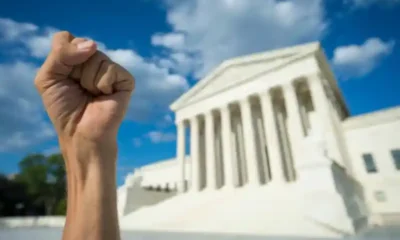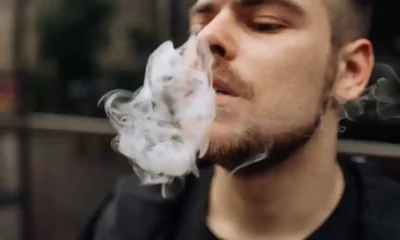Connect with us
Published
2 years agoon

As the first state to legalize recreational cannabis use on November 6, 2012, Colorado is finally playing some catchup surrounding cannabis policy. Specifically, Governor Jared Polis shared an executive order that the state will not hold out-of-state convictions for most cannabis-related offenses against people applying for professional licenses in Colorado.
The executive order was issued July 14, with Polis declaring that anyone consuming, possessing, growing or processing cannabis in accordance with Colorado law shouldn’t be subject to professional sanctions or revocation of professional licenses, including people engaging in cannabis-related activities in other states “in a manner that would be legal in Colorado.”
The Colorado Department of Regulatory Agencies (DORA) and Department of Revenue will ensure such protections, according to Polis’ order, with direction to the agencies not to cooperate with out-of-state investigations “related to disciplinary action against a professional license, certification, or credential for marijuana-related actions” that are legal in the state.
Polis gave the same direction to the Colorado Marijuana Enforcement Division and further prohibited state agencies from providing information or expending “time, money, facilities, property, equipment, personnel or other resources” to cooperate in or aid any out-of-state investigation looking to sanction any person’s professional license for lawful cannabis-related conduct that took place in Colorado.
The governor noted that Colorado will still make exceptions to the rule if it is bound by a court order.
The order applies to actions that are lawful in Colorado. Therefore, the order doesn’t apply to people convicted of or under investigation for cannabis-related actions that remain illegal in the state, like selling to minors or trafficking on the black market.
Polis writes, “There is a workforce shortage in Colorado. Employers are having difficulty recruiting and retaining qualified employees, many of whom need professional licenses. The exclusion of people from the workforce because of marijuana-related activities that are lawful in Colorado, but illegal in other states, hinders our economy and our state.”
According to a 2021 report from the Colorado Department of Public Safety, about 19% of Colorado adults reported cannabis use within the past 30 days. In a statement accompanying the order, Polis said the exclusion of people from the workforce because of cannabis-related activities that are legal in the state “hinders our residents, economy and our State.”
“No one who lawfully consumes, possesses, cultivates or processes marijuana pursuant to Colorado law should be subject to professional sanctions or denied a professional license in Colorado,” Polis said.
Polis has historically been supportive of statewide and national cannabis reform during his time as governor and previously a U.S. representative. Though, the order doesn’t prevent a private employer from disciplining or firing employees for cannabis use.
Mellis Dworkin, Polis’ deputy press secretary, told Westword that no executive order can impact employment law, specifically the legal ability of private employers regarding permitted and prohibited activities or testing—To do so would require a bill in the legislature.
“This new executive order will simply allow employers to hire people for jobs that require occupational or professional licensure through the state from a broader pool of applicants,” Dworkin said. “This executive order modernized our licensing to today’s laws and will help address workforce shortages in key professions.”
Colorado has made several attempts in the state legislature to protect the right to consume cannabis during off hours.In 2015, the state Supreme Court ruled in favor of DISH Network, after it fired a medical cannabis patient for consuming cannabis off hours, ultimately setting a precedent that recreational or medical cannabis use, at any time, could be grounds for dismissal in Colorado.
A 2020 bill aimed to ensure recreational cannabis use would not be a fireable offense in Colorado, though it was rejected 0-10 in its first committee vote. Another bill proposing similar protections introduced earlier this year was also killed in its first committee vote, with lawmakers citing the same objections they’d made in 2020—namely that they were cautious about offering their support because of insufficient scientific impairment testing for cannabis use and claiming that allowing for off-hour cannabis use would lead to less safe workplaces statewide.
Other states, including Nevada, New York and Massachusetts have already made the leap, along with a number of other states that protect medical cannabis use outside of work.


You Don’t Understand the Difference Between Decriminalizing and Legalizing, Do You?


North Dakota Committee Files Ballot Measure To Legalize Adult-Use Cannabis


California County Mulls Reduction To Cannabis Cultivation Tax


Cheech and Chong Become Newest Operators in Call of Duty


Manage Your Munchies: This Year’s Top 420 Meal Deals


New York Cannabis Control Board Approves 101 New Adult-Use Licenses
